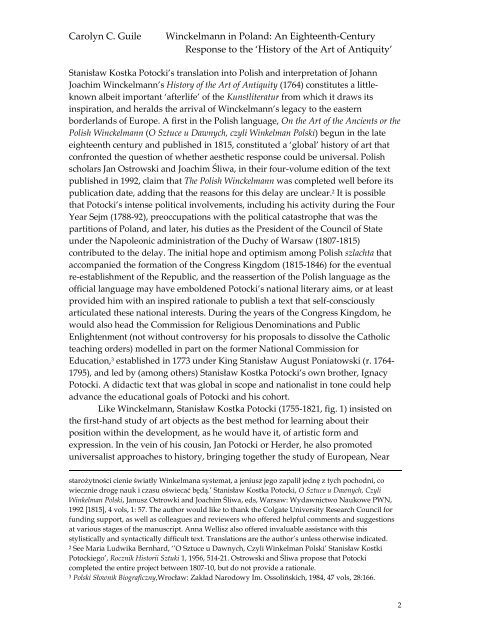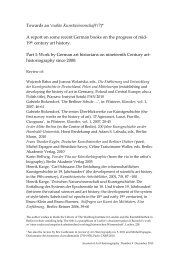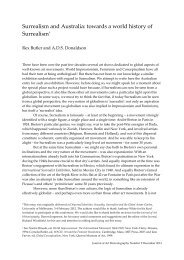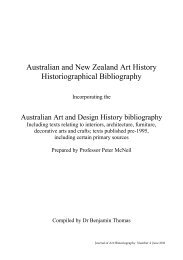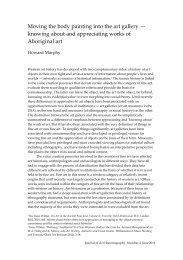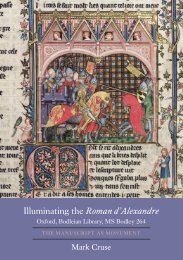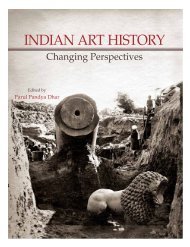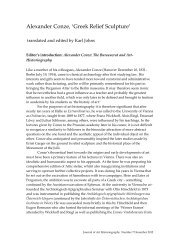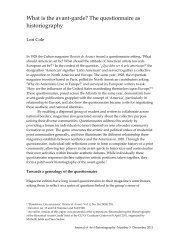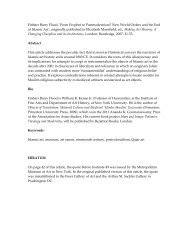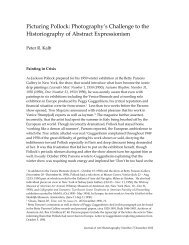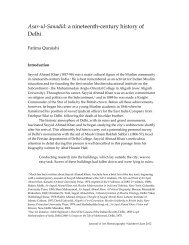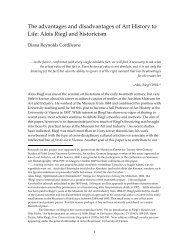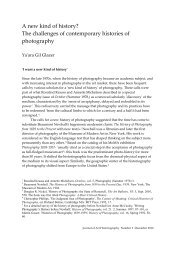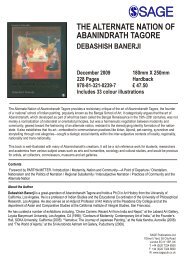9/CCG1 - Journal of Art Historiography
9/CCG1 - Journal of Art Historiography
9/CCG1 - Journal of Art Historiography
You also want an ePaper? Increase the reach of your titles
YUMPU automatically turns print PDFs into web optimized ePapers that Google loves.
Carolyn C. Guile<br />
Winckelmann in Poland: An Eighteenth-Century<br />
Response to the ‘History <strong>of</strong> the <strong>Art</strong> <strong>of</strong> Antiquity’<br />
Stanisław Kostka Potocki’s translation into Polish and interpretation <strong>of</strong> Johann<br />
Joachim Winckelmann’s History <strong>of</strong> the <strong>Art</strong> <strong>of</strong> Antiquity (1764) constitutes a littleknown<br />
albeit important ‘afterlife’ <strong>of</strong> the Kunstliteratur from which it draws its<br />
inspiration, and heralds the arrival <strong>of</strong> Winckelmann’s legacy to the eastern<br />
borderlands <strong>of</strong> Europe. A first in the Polish language, On the <strong>Art</strong> <strong>of</strong> the Ancients or the<br />
Polish Winckelmann (O Sztuce u Dawnych, czyli Winkelman Polski) begun in the late<br />
eighteenth century and published in 1815, constituted a ‘global’ history <strong>of</strong> art that<br />
confronted the question <strong>of</strong> whether aesthetic response could be universal. Polish<br />
scholars Jan Ostrowski and Joachim Śliwa, in their four-volume edition <strong>of</strong> the text<br />
published in 1992, claim that The Polish Winckelmann was completed well before its<br />
publication date, adding that the reasons for this delay are unclear. 2 It is possible<br />
that Potocki’s intense political involvements, including his activity during the Four<br />
Year Sejm (1788-92), preoccupations with the political catastrophe that was the<br />
partitions <strong>of</strong> Poland, and later, his duties as the President <strong>of</strong> the Council <strong>of</strong> State<br />
under the Napoleonic administration <strong>of</strong> the Duchy <strong>of</strong> Warsaw (1807-1815)<br />
contributed to the delay. The initial hope and optimism among Polish szlachta that<br />
accompanied the formation <strong>of</strong> the Congress Kingdom (1815-1846) for the eventual<br />
re-establishment <strong>of</strong> the Republic, and the reassertion <strong>of</strong> the Polish language as the<br />
<strong>of</strong>ficial language may have emboldened Potocki’s national literary aims, or at least<br />
provided him with an inspired rationale to publish a text that self-consciously<br />
articulated these national interests. During the years <strong>of</strong> the Congress Kingdom, he<br />
would also head the Commission for Religious Denominations and Public<br />
Enlightenment (not without controversy for his proposals to dissolve the Catholic<br />
teaching orders) modelled in part on the former National Commission for<br />
Education, 3 established in 1773 under King Stanisław August Poniatowski (r. 1764-<br />
1795), and led by (among others) Stanisław Kostka Potocki’s own brother, Ignacy<br />
Potocki. A didactic text that was global in scope and nationalist in tone could help<br />
advance the educational goals <strong>of</strong> Potocki and his cohort.<br />
Like Winckelmann, Stanisław Kostka Potocki (1755-1821, fig. 1) insisted on<br />
the first-hand study <strong>of</strong> art objects as the best method for learning about their<br />
position within the development, as he would have it, <strong>of</strong> artistic form and<br />
expression. In the vein <strong>of</strong> his cousin, Jan Potocki or Herder, he also promoted<br />
universalist approaches to history, bringing together the study <strong>of</strong> European, Near<br />
starożytności cienie światły Winkelmana systemat, a jeniusz jego zapalił jednę z tych pochodni, co<br />
wiecznie drogę nauk i czasu oświecać będą.’ Stanisław Kostka Potocki, O Sztuce u Dawnych, Czyli<br />
Winkelman Polski, Janusz Ostrowki and Joachim Śliwa, eds, Warsaw: Wydawnictwo Naukowe PWN,<br />
1992 [1815], 4 vols, 1: 57. The author would like to thank the Colgate University Research Council for<br />
funding support, as well as colleagues and reviewers who <strong>of</strong>fered helpful comments and suggestions<br />
at various stages <strong>of</strong> the manuscript. Anna Wellisz also <strong>of</strong>fered invaluable assistance with this<br />
stylistically and syntactically difficult text. Translations are the author’s unless otherwise indicated.<br />
2 See Maria Ludwika Bernhard, ‘’O Sztuce u Dawnych, Czyli Winkelman Polski’ Stanisław Kostki<br />
Potockiego’, Rocznik Historii Sztuki 1, 1956, 514-21. Ostrowski and Śliwa propose that Potocki<br />
completed the entire project between 1807-10, but do not provide a rationale.<br />
3 Polski Słownik Biograficzny,Wrocław: Zakład Narodowy Im. Ossolińskich, 1984, 47 vols, 28:166.<br />
2


